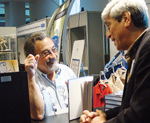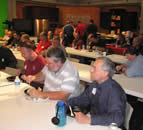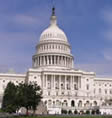Remembering John Battison
I first met John Battison in 1981. At the time he was director of engineering for the WOSU stations at Ohio State University. I was chief engineer at a small-market AM/FM station in far northern California. I was also serving as editor of the SBE Signal newsletter. Back in the late 1970s and early 80s I wrote a number of freelance articles for the trade journals Broadcast Engineering, Broadcast/Management Engineering, and Broadcast Communication. These were competing publications and over a three-month period I had articles published in all three. By virtue of my freelance writing, then-SBE President Roger Johnson asked if I would take on the task of putting together the SBE Signal. I was more than happy to comply.
Those SBE members of some years will recall that back in the early 1980s the SBE leadership decided that in order to expand the membership of the organization, a name change would be essential. At the time, cable television systems were being built at a record pace and it seemed a natural extension of the SBE's scope to encompass video and audio engineers working in the cable business.
While the logic of the move was clear to many members, others felt it would dilute the focus of the SBE, which they argued should be strictly on radio and television broadcasting. Long-time members had not forgotten the merger of the Institute of Radio Engineers with the Institute of Electrical Engineers to form the IEEE. It was dissatisfaction with the IRE/IEE merger that led John to propose, in an editorial in Broadcast Engineering, that an organization be formed to focus solely on radio and television engineering. The end result, of course, was the Society of Broadcast Engineers. Changing the name to the Society of Broadcast and Communications Engineers (or something like that) was a non-starter with John and others in the SBE. My task, according to then-President Johnson (Roger, that is) was to write an article for the SBE Signal discussing both sides of the issue. In search of a dissenting opinion, I naturally focused on John, the founder and first president.
 John with his wife, Sarah, and Jerry on the occasion of his receiving the Lifetime Achievement Award from the SBE (2006).
John with his wife, Sarah, and Jerry on the occasion of his receiving the Lifetime Achievement Award from the SBE (2006). |
I knew John only by reputation; he was well-known-a pillar of the industry. Summoning all the courage I had, I called John at OSU. Remarkably, he took my call, and was patient and courteous as I asked my prepared questions. The quotes I got from John were superb-of course, I didn't expect any less. That one conversation led to a long friendship that stretched over three decades.
I last saw John in the most unusual of locations-a local grocery store in my home town of Morgan Hill, CA (population ~30,000). Morgan Hill is well off the beaten path and more than half a continent from his hometown of Loudonville, OH. John's daughter, Victoria, lives in Morgan Hill, and I saw her while shopping for some groceries. She said, "You'll never guess who is here with me?" Well, it was John. Although he appeared quite frail at the time, we still had a very nice visit.
John was a valuable asset to the SBE not just because his efforts led to formation of the organization. More than that, he had a sincere interest in understanding differing points of view. He could, for example, be strongly opposed to the SBE name change in 1981 but understand the reasoning behind the idea, and recognize that the proponents of the change were doing what they thought was best for the organization.
A decade later, the SBE faced another crisis of sorts. It came to pass that due to financial setbacks, a steep increase in dues was needed. At the same time, certain changes were made to the bylaws by the Board of Directors. These actions, taken together, seemed heavy-handed to some members, culminating in a very unpleasant annual meeting at the 1992 NAB Convention in Las Vegas. I happened to be vice president of the SBE at the time, serving with Rick Farquhar, who was president. I voted reluctantly-like most of the Board-for these measures. John was one of the members opposed to both the steep dues increase and the bylaws changes.
It fell to Rick and me to explain to the membership what the Board had done and why. The meeting was not the SBE's finest hour, but we got through it. While John was opposed to the actions, he recognized that they were done in good faith and that the Board should be given the benefit of the doubt. And he said so publically. He was the kind of person you could argue with over some issue, and then afterward let the disagreement go and move on. Not everyone has that capacity.
John also was able to stay involved in the SBE for a very long period of time. Not all leaders of the Society have been able to do that. It is not uncommon for a person to become closely involved in an organization, serve in various capacities, and then burn out on the organization-or burn so many bridges that they find themselves on the outside looking in. John avoided that trap, knowing when it was time to say something and when it was time to sit down and let somebody else run the show.
I had the privilege of serving with John on the SBE National Convention organizing committee. After John left OSU, I proposed to then-President Richard Rudman that the SBE try and continue the OSU seminars that John had begun and run successfully for many years. Fortunately, John was interested and so was Richard. John served as chairman of the committee until the SBE National Convention was merged into the World Media Expo show, which was a combination of SBE, NAB, and SMPTE programs. That step led to the long and valuable relationship between the SBE and the annual NAB Convention, which continues to this day.
It was also my privilege in 1999, as chair of the NAB/SBE Engineering Conference Committee, to nominate John for the NAB Engineering Achievement Award for Radio. He received the award at the NAB Technology Luncheon to the applause of hundreds of SBE members.
John Battison was not simply an intelligent and hard working engineer. Not simply the founder of the SBE. He was an example to engineers that hard work pays off and that understanding people is as important as understanding technology.
Jerry Whitaker
7 April 2016









